Don't quit your day job

It's good to be in logistics. Or at least that's what the results of DC Velocity's 2012 Salary Survey suggest. Of the 602 readers who participated in our survey, 86 percent said they were satisfied with their career and would recommend it to someone entering the workforce.
What's behind the high level of job satisfaction? Part of it is surely financial. According to the survey results, our reader's average salary is $106,311 and the median salary is $90,000. (For a breakdown of average salary by position, see Exhibit 1.) That's up 6 percent from the average salary reported in last year's survey. Indeed, 65 percent of respondents reported that their paychecks were fatter this year than last, with an average increase of 7 percent.
While a six-figure salary is nothing to turn up your nose at, those numbers actually sound low to Susan Rider, president of the consulting firm Rider & Associates LLC. For supervisor positions, she is seeing salaries that run $10,000 higher than the average reported in our survey, and for the more senior positions (directors, vice president, president), she generally sees salaries that are $50,000 to $75,000 higher.
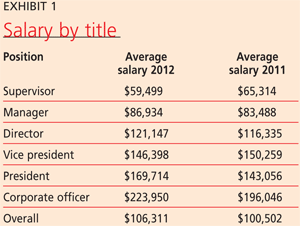
|
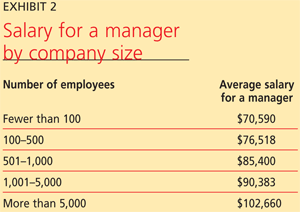
|
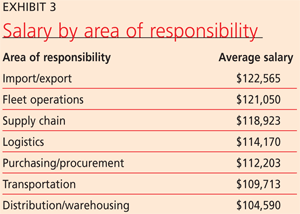
|
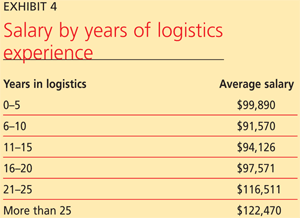
|
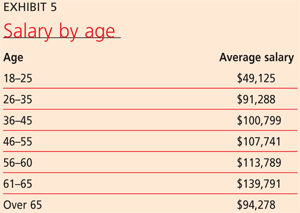
|
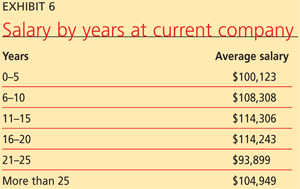
|
How to increase your worth
If you're looking to boost your pay, our survey results indicate there may be some steps you can take to increase your earning power. They are as follows:
- Move to a bigger company. As Exhibit 2 indicates, larger companies (particularly those with over 5,000 employees) tend to pay higher salaries. (To provide as accurate a comparison as possible, Exhibit 2 only looks at the average salary for managers, as nearly half of all respondents are managers.)
- Take a job that reaches outside the distribution center. While 66 percent of respondents said they had direct or indirect management control or influence over warehousing/distribution center operations, this was not the path to the big bucks. Those who reported having responsibility for warehousing or distribution center operations have the lowest average salary by job responsibility (see Exhibit 3).
- Develop specialized skills. On the other side of the spectrum, those who had management control or influence over import/export operations reported the highest salaries. Rider says this isn't surprising. "Government regulation, terrorism, and Homeland Security continue to compel a certain amount of knowledge and specialization. But the number of people who have that knowledge is limited," she explains.
Other specialized skills in high demand include international supply chain experience, lean management, and FDA and U.S. Department of Agriculture validation expertise, Rider says. She adds that employers are also seeking people who have proficiency with warehouse management systems.
The survey also showed that those responsible for fleet operations out-earned most of their peers. Rider suspects that rising fuel prices and growing capacity concerns have made companies more willing to pay for expertise in this area. - Stick around. If you haven't achieved your target salary yet, you just might need a few more years of experience. Responses to the salary survey show that in general, the more experience you have in logistics, the higher your salary—particularly for those who have more than 20 years of experience. The one anomaly seems to be respondents who have less than five years of experience in logistics, whose average salary of $99,890 was higher than expected. (See Exhibit 4.) Similarly, Exhibit 5 shows that the older the respondent, the higher the salary (until respondents hit age 65, when many might be in a semi-retired state).
- But don't wear out your welcome. While the survey does seem to indicate that companies reward loyalty, that seems to be true only to a certain point. Average salary rises along with tenure at a company until about year 15, when the average salary levels off and then drops a bit. (See Exhibit 6.)
- Be male. This may sound glib, but the sobering fact remains that men in the logistics field are still out-earning women. The first DC Velocity salary survey back in 2006 noted that discrepancy, and things haven't changed much in the past six years. This year, females made up 10 percent of the survey respondents, and their average salary ($76,572) was significantly lower than the average salary of their male counterparts ($109,787).
"I have to say that the supply chain/warehousing/logistics world is a little behind the times," says Rider. "I also think it has something to do with the fact that women are still in lower-level positions as supervisors and managers. It took us a while as women to break into the industry, and we are still working our way up."
But the gap does not appear to be narrowing. In the 2007 survey, female managers on average earned 22 percent less than males ($65,774 vs. $80,225). In 2012, female managers on average earned 25 percent less than their male counterparts ($73,167 vs. $91,366). Furthermore, slicing the data by age or years of logistics experience produced no change in the results. - Go back to school. While an advanced degree comes with a high price tag these days, it also translates into a higher average salary. Respondents with a master's degree or higher reported an average salary of $141,287, compared with $104,020 for those with a bachelor's degree and $85,280 for a high school diploma. Likewise, certifications for specialized skills are carrying much more weight than they used to, says Rider.
One factor that does not seem to have much effect on salary is region of the country. It's hard to see any patterns when you look at the last three years' worth of data from the survey. (See Exhibit 7.) However, salaries may be higher in areas that are considered logistics hubs, such as Columbus, Ohio; Memphis, Tenn.; and Louisville, Ky., says Rider. She speculates that may be the reason why she sees higher salaries than those reported in DC Velocity's survey.

It's not all about the Benjamins
While money is important, it was not what the majority of readers mentioned when asked what they liked most about their job. Instead, they said they enjoyed solving the ever-changing challenges they confronted on a daily basis. As one respondent noted, "The job is the same, but it is different ever day."
Also, many mentioned that they liked the people or teams they work with and the interaction with different departments, customers, and suppliers. While it may sound trite, this underlines an important point. Logistics isn't just about shipping product; it's about managing relationships—with fellow employees as well as with other departments, suppliers, partners, and customers.
Indeed, companies highly value logistics professionals with communication and management skills, says Rider. "The soft skills of managing and motivating people are a huge priority for companies," she says. "Particularly as young millennials are proving to be challenging for older generations from a management perspective. How you work with the younger workforce is different. You can't continue to do what you've always done and be successful."
Another factor that may be contributing to job satisfaction is logistics' growing influence in many companies. Just under 70 percent of respondents reported that the number of functions they manage has risen in the past three years. Many said their favorite thing about their job was the level of autonomy that they had and the ability to make decisions that affect the company's bottom line.
But that added responsibility comes with a downside. When asked what they didn't like about their jobs, respondents cited long hours, too much travel, and increased stress. Forty-five percent of respondents said they work more than 50 hours a week, and 37 percent said the number of hours they work has increased. And while many enjoy a feeling of autonomy, others are still fighting to get the ear of C-level executives.
Keep 'em happy
The relatively high pay is indicative of the fact that people with logistics and supply chain expertise are in a unique position at the moment. Despite all the talk of a "jobless recovery," logistics and supply chain skills are still in high demand. Indeed, as business rebounds, companies may need to take a closer look at what they need to do to hold onto good employees.
Rider says that for younger workers, quality-of-life factors are more important than they've been to previous generations. While older workers may not care so much about whether there's an Xbox in the break room or whether the company has a soccer team, a fun work environment that creates a sense of camaraderie is important to younger workers. And workers of all ages are more interested in flex time and alternative working arrangements, such as the flexibility to work from home, says Rider.
The good news for employers is that what people want is not necessarily more money. "It's appreciation, challenge, and culture," says Rider. "And these are things that are easy for companies to do if they focus on it."
Related Articles

Copyright ©2024. All Rights ReservedDesign, CMS, Hosting & Web Development :: ePublishing